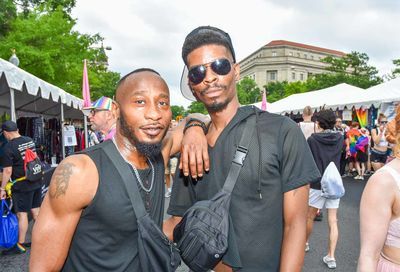Democrats win Georgia runoff races, gaining control of U.S. Senate
LGBTQ groups are optimistic about the fate of pro-equality legislation, but filibuster reform will be needed first

On Tuesday evening, Rev. Raphael Warnock, the pastor of the historic Ebenezer Baptist Church, was declared the winner of the seat currently filled by Republican Kelly Loeffler, who was appointed to fill a vacancy left open by the retirement of Sen. Johnny Isakson. He will serve the remaining two years of Isakson’s term, before having to run again for a full six-year term in 2022.
The next day, Democrat Jon Ossoff was declared winner of the other Senate race, unseating Republican incumbent David Perdue. If Ossoff’s lead — currently at eight-tenths of a percentage — remains above 0.5% as the remaining few ballots are counted, he will avoid a mandatory recount.
For Democrats, Tuesday’s races in Georgia were welcome news. The Senate now stands at 50 Republicans and 48 Democrats, as well as two independents who caucus with Democrats, creating a 50-50 split, allowing Vice President-elect Kamala Harris to cast tie-breaking votes when legislation deadlocks along partisan lines. It also means, in terms of Senate control, that Democratic Leader Chuck Schumer (N.Y.), and not Republican Leader Mitch McConnell (Ky.), will be setting the agenda and that Democrats will be in charge of various committees.
For the Biden administration, this not only means an easier path for cabinet officers and other appointees, including judges, but gives renewed hope to some activists that legislation they have long advocated for can become law if prioritized by the new administration.
“Georgia’s voters delivered a resounding message yesterday: they want action on the crises we face and they want it right now,” Biden said in a statement acknowledging the victories. “On COVID-19, on economic relief, on climate, on racial justice, on voting rights and so much more.”
Among the groups expressing cautious optimism about the future are LGBTQ organizations, who hold onto hope that Democratic control of the U.S. Senate will allow allies to usher through the Equality Act and other pro-LGBTQ bills that have passed the House but languished in a Senate under Republican control.
“It’s clear that the voters of Georgia support a pro-equality agenda at the White House and in the U.S. Senate,” GLAAD President and CEO Sarah Kate Ellis said in a statement. “We congratulate Jon Ossoff and Raphael Warnock, and we look forward to working with them and President-elect Biden to secure comprehensive protections for LGBTQ people that an overwhelming majority of Americans already support. We are counting on their commitment to support the Equality Act, protecting LGBTQ people in Georgia and across the country from discrimination.
“The new Senate must turn the tide on issues that disproportionately impact LGBTQ Americans like COVID-19, health care, and racial justice. We must begin to repair the damage done to the LGBTQ community and so many others by the outgoing administration, and focus on ensuring our country is a place where all can be safe and have the same chances to succeed.”
“As a former Georgian, I am thrilled that two Senate candidates who strongly support LGBTQ equality have carried the day,” Kierra Johnson, incoming executive director of the National LGBTQ Task Force, said in a statement. “The National LGBTQ Task Force pledges to work with Senators-elect Rev. Raphael Warnock and Jon Ossoff to pass the Equality Act as we continue to advocate for racial, economic, gender, reproductive justice, and equity for all.”
“Georgians have made their voices heard and united for equality by electing Raphael Warnock and Jon Ossoff, installing a new pro-equality majority in the United States Senate,” Alphonso David, president of the Human Rights Campaign, said in a statement. “We celebrate this incredible moment and we are proud to have helped them across the finish line by deploying our staff to engage and mobilize the 1.3 million Equality Voters across the state. These victories ensure a pro-equality Senate majority alongside a pro-equality House majority and a Biden presidency, which will work together to pass the Equality Act and enshrine protections for all LGBTQ people.”
The biggest challenge facing any LGBTQ bill — besides likely opposition from the bulk of Republican senators — is the filibuster, which remains in place for regular legislation (though not for judicial or cabinet nominations), meaning that in past sessions, a minority of senators can block an LGBTQ rights bill as long as they can prevent Democrats from getting 60 votes in favor of a proposed bill.
One of the reforms favored most by left-wing activists has been to eliminate the filibuster entirely, but a handful of conservative Democrats — including Sens. Joe Manchin (W.V.), Dianne Feinstein (Calif.), Kyrsten Sinema (Ariz.) and Mark Kelly (Ariz.) — are wary of such action and would likely vote against implementing such a change. A compromise measure could be to reform the filibuster by placing the burden on the minority party to sustain a live filibuster — meaning they would have to go to the floor and publicly explain their opposition to a measure, and would have to keep at least 41 senators in line in order to block legislation.
If Senate Democrats fail to achieve any meaningful reform of the filibuster, any LGBTQ rights measure should be considered dead on arrival in the U.S. Senate, given that only three Republican senators — Lisa Murkowski (Ak.), Susan Collins (Me.) and Rob Portman (Oh.) — have publicly expressed pro-LGBTQ sentiments. Failure to reform the filibuster would mean the fate of pro-equality legislation would be no different than if Republicans had retained control of the upper chamber.
Such a situation could result in future recriminations for the Democratic Party, particularly if LGBTQ people choose to withhold their votes from the party as punishment or abstain from voting altogether. Additionally, some richer LGBTQ people and political donors who may not be as socially liberal or aren’t as ideologically welded to the party’s platform could begin showering their largess on GOP candidates instead.
In a prepared statement, Lambda Legal CEO Kevin Jennings expressed hope that a Democratic-controlled Senate, working with the Biden administration, would prioritize making it easier for LGBTQ people and people with HIV to access health care, and are not denied rights or privileges to which they are entitled by the existence of unconstitutional laws.
“If the past 10 years have demonstrated anything, it is the importance of the Senate in determining whether the government will work for the people to advance equality and opportunity, or whether it will stand in the way of progress,” Jennings said.
Read Next
Protesters breach U.S. Capitol Building as pro-Trump demonstrations spiral out of control
Support Metro Weekly’s Journalism
These are challenging times for news organizations. And yet it’s crucial we stay active and provide vital resources and information to both our local readers and the world. So won’t you please take a moment and consider supporting Metro Weekly with a membership? For as little as $5 a month, you can help ensure Metro Weekly magazine and MetroWeekly.com remain free, viable resources as we provide the best, most diverse, culturally-resonant LGBTQ coverage in both the D.C. region and around the world. Memberships come with exclusive perks and discounts, your own personal digital delivery of each week’s magazine (and an archive), access to our Member's Lounge when it launches this fall, and exclusive members-only items like Metro Weekly Membership Mugs and Tote Bags! Check out all our membership levels here and please join us today!




























You must be logged in to post a comment.